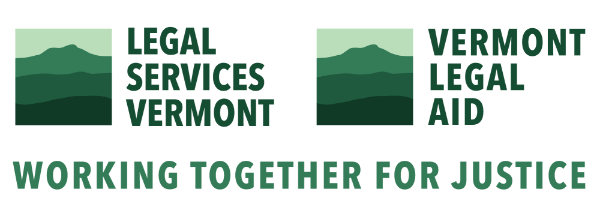Vermont Flooding - Updated 10/10/2024
- If you were affected by flooding between July 9 - 11, 2024, in seven counties in Vermont, the deadline to apply for Disaster Unemployment Assistance is October 25, 2024. However, you should apply as soon as possible.
- If you were affected by flooding between July 29 - 31, 2024, in three counties in Vermont, the deadline to apply for Disaster Unemployment Assistance is December 2, 2024. Again, you should apply as soon as possible.
- If you applied for unemployment because of the flood and you haven’t gotten it yet, or you were denied unemployment insurance money, please contact us. We may be able to help.
What is Disaster Unemployment Assistance?
Disaster Unemployment Assistance is a temporary federal unemployment benefit. It is for workers and self-employed people who are out of work because of a major disaster, but do not qualify for regular unemployment benefits.
The Vermont Department of Labor runs the program. See their website for information about Disaster Unemployment Assistance and how to apply.
Who can get Disaster Unemployment Assistance?
A. People who lost work because of the flooding that took place July 9 - 11, 2024, and
- don’t qualify for regular unemployment benefits, and
- live or work in one of the counties declared “major disaster” areas:
- Addison County
- Caledonia County
- Chittenden County
- Essex County
- Lamoille County
- Orleans County
- Washington County
B. People who lost work because of the flooding that took place July 29 - 31, 2024, and
- don’t qualify for regular unemployment benefits, and
- live or work in one of the counties declared “major disaster” areas:
- Caledonia County
- Essex County
- Orleans County
You must show that that one of these situations applies to you. As a direct result of the major disaster:
- You no longer have a job, or
- You can’t get to your job, or
- You were about to start a new job, but now the job doesn’t exist, or you can’t get to it, or
- You can’t work because you have an injury directly caused by the major disaster, or
- You are now the breadwinner because the head of your household died from the major disaster.
You must be physically able to work, and you must be available to accept a suitable job, unless one of these exceptions apply to you:
- You have an injury directly caused by the disaster, or
- You were self-employed and are taking steps to get back to your self-employment, or
- You are enrolled in job training approved by the Vermont Department of Labor.
You will not have to look for a new job if you will go back to your usual job within 10 weeks. When you apply, you will have to give the date you expect to return to work.
How do I apply for Disaster Unemployment Assistance?
First, you need to apply for regular unemployment benefits. This is because you can’t get Disaster Unemployment Assistance if you are able to get regular unemployment.
To apply, call the Vermont Labor Department’s initial claims line at 1-877-214-3330.
If you do not qualify for regular unemployment, you will get instructions on how to file claims for Disaster Unemployment Assistance for each week you are unemployed due to the flood.
When should I apply?
For people who lost work because of the flooding that took place July 9 - 11, 2024, the deadline is October 25, 2024. But you should apply as soon as possible. When you apply, you will be able to ask for benefits going back to the week of July 14 - 20, 2024.
For people who lost work because of the flooding that took place July 29 - 31, 2024, the deadline is December 2, 2024. But you should apply as soon as possible. When you apply, you will be able to ask for benefits going back to the week of August 4 - 10, 2024.
You may be able to file after the deadline if you have a good reason. But your application may not be accepted, especially if it is very late. It is risky to apply late.
What information will I need to apply?
The Vermont Department of Labor’s website has a list of information you should have ready when you apply for regular unemployment.
Their website also lists the documentation you will need to apply for Disaster Unemployment Assistance.
You will need to know the last day you worked, and the amount of any money you have earned since July 14.
If you are on a temporary layoff, be prepared to give your estimated return to work date.
What paperwork will I need to get Disaster Unemployment Assistance?
If you lost your job or can’t get to your job because of the flooding
The Labor Department will need to verify this.
Be prepared to give the name and contact information for someone who can confirm that you were working for your employer before the flooding, but there is no work for you now because of the disaster.
If you have any texts, emails, or other written communication from your employer, you should save them and be prepared to send them to the Labor Department.
If you were about to start a new job, but now the job doesn’t exist, or you can’t get to it
The Labor Department will need to verify this.
Be prepared to give the name and contact information for the person who offered you the job to confirm they had to cancel the job offer.
If you have any texts, emails, or other written communications about the work being cancelled, you should save them and be prepared to send them to the Labor Department.
If you can’t work because you have an injury caused by the flooding
The Labor Department will need to verify this.
Be prepared to give the name and contact information for the health care provider who treated your injury.
If you have any discharge instructions or other medical records about the injury, you should save them and be prepared to send them to the Labor Department.
If you were self-employed or an independent contractor:
You will need to send in proof that you were self-employed.
You will need to send in proof of your net income from self-employment in 2023 so your benefit amount can be calculated.
The best proof of your self-employment and net income is a copy of your 2023 income tax returns.
You can also send in other records to show your self-employment and income:
- financial statements or check stubs
- bank records
- 1099 forms
- sales Tax Return
- business or occupational license
- State or Federal Employer Identification Number
- property titles, deeds, or rental agreement for your place of business
- recent newspaper, phone book, or internet ad for your business
- statement(s) from recent customers, billing notices, invoices, business or sales records
What if I apply for DUA and do not get the benefits, or I have trouble applying?
Fill out our form and we will call you back. Your information will be sent to Legal Services Vermont, which screens requests for help for both Vermont Legal Aid and Legal Services Vermont. You can also call us at 1-800-889-2047.
Also on VTLawHelp.org
- Legal and benefits issues after a disaster like flooding
- Vermont renter / tenant FAQs after a disaster
- Filing an insurance claim after a disaster
- Applying for financial help and services from FEMA and appealing a FEMA decision
- SBA disaster loans for homeowners and renters
- Tax relief after a disaster
- Mortgages and property taxes after a disaster

